|
Books Should Be Free Loyal Books Free Public Domain Audiobooks & eBook Downloads |
|
|
Books Should Be Free Loyal Books Free Public Domain Audiobooks & eBook Downloads |
|
Religion |
|---|
|
Book type:
Sort by:
View by:
|
By: Jacob Bryant (1715-1804) | |
|---|---|
 A New System; or, an Analysis of Antient Mythology. Volume I.
A New System; or, an Analysis of Antient Mythology. Volume I.
| |
By: James Allen | |
|---|---|
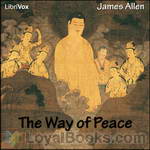 The Way of Peace
The Way of Peace
The Way of Peace is your guide to the power of meditation; self and truth; the acquirement of spiritual power; the realization of selfless love; entering into the infinite; saints, sages, and saviors; the law of service; and the realization of perfect peace. | |
By: James Buchanan (1804-1870) | |
|---|---|
 Modern Atheism under its forms of Pantheism, Materialism, Secularism, Development, and Natural Laws
Modern Atheism under its forms of Pantheism, Materialism, Secularism, Development, and Natural Laws
| |
By: James Cardinal Gibbons (1834-1921) | |
|---|---|
 The Faith of Our Fathers
The Faith of Our Fathers
The Faith of Our Fathers: A Plain Exposition and Vindication of the Church Founded by Our Lord Jesus Christ is a book published in 1876 by archbishop James Gibbons, which became a best-selling conversion manual in the United States, and by 1980 was in its 111th printing.(From the preface) “The object of this little volume is to present in a plain and practical form an exposition and vindication of the principal tenets of the Catholic Church. It was thought sufficient to devote but a brief space to such Catholic doctrines and practices as are happily admitted by Protestants, while those that are controverted by them are more elaborately elucidated... | |
By: James Challis (1803-1882) | |
|---|---|
 An Essay on the Scriptural Doctrine of Immortality
An Essay on the Scriptural Doctrine of Immortality
| |
By: James Denney (1856-1917) | |
|---|---|
 The Atonement and the Modern Mind
The Atonement and the Modern Mind
| |
By: James E. Talmage | |
|---|---|
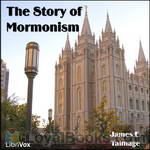 The Story of Mormonism
The Story of Mormonism
A few years before James E. Talmage was called to serve as an apostle for the Church of Jesus Christ of Latter-day Saints (also known as the "Mormon" church), he gave a series of lectures at universities such as the University of Michigan and Cornell, describing the history of the Church. These lectures were later compiled and published as 'The Story of "Mormonism."' It is a concise, yet informative summary for all interested in learning the history and beliefs of the "Mormon" church. (Summary by Nathan Markham) | |
By: James Edward Talmage (1862-1933) | |
|---|---|
 Jesus the Christ A Study of the Messiah and His Mission According to Holy Scriptures Both Ancient and Modern
Jesus the Christ A Study of the Messiah and His Mission According to Holy Scriptures Both Ancient and Modern
| |
By: James Frazer (1854-1941) | |
|---|---|
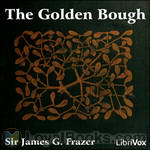 The Golden Bough
The Golden Bough
The Golden Bough: A Study in Magic and Religion is a wide-ranging comparative study of mythology and religion, written by Scottish anthropologist Sir James George Frazer (1854–1941). It offered a modernist approach, discussing religion dispassionately as a cultural phenomenon, rather than from a theological perspective. Although most of its theories have subsequently been exploded (the most famous one being that of the relationship between magic, religion and science), its impact on contemporaneous European literature was substantial... | |
By: James Freeman Clarke (1810-1888) | |
|---|---|
 Orthodoxy: Its Truths And Errors
Orthodoxy: Its Truths And Errors
| |
By: James H. (James Henry) Snowden (1852-1936) | |
|---|---|
 A Wonderful Night; An Interpretation Of Christmas
A Wonderful Night; An Interpretation Of Christmas
| |
By: James H. Moon (1830-) | |
|---|---|
 Water Baptism A Pagan and Jewish Rite but not Christian, Proven By Scripture And History Confirmed By The Lives Of Saints Who Were Never Baptized With Water
Water Baptism A Pagan and Jewish Rite but not Christian, Proven By Scripture And History Confirmed By The Lives Of Saints Who Were Never Baptized With Water
| |
By: James Hamilton (1814-1867) | |
|---|---|
 Life of Bunyan [Works of the English Puritan divines]
Life of Bunyan [Works of the English Puritan divines]
| |
By: James Hudson Taylor (1832-1905) | |
|---|---|
 A Ribband of Blue And Other Bible Studies
A Ribband of Blue And Other Bible Studies
| |
 Separation and Service or Thoughts on Numbers VI, VII.
Separation and Service or Thoughts on Numbers VI, VII.
| |
By: James Janeway (1636?-1674) | |
|---|---|
 Stories of Boys and Girls Who Loved the Saviour A Token for Children
Stories of Boys and Girls Who Loved the Saviour A Token for Children
| |
By: James Kennedy (1815-1899) | |
|---|---|
 Life and Work in Benares and Kumaon, 1839-1877
Life and Work in Benares and Kumaon, 1839-1877
| |
By: James Kerr (1847-1905) | |
|---|---|
 The Covenants And The Covenanters Covenants, Sermons, and Documents of the Covenanted Reformation
The Covenants And The Covenanters Covenants, Sermons, and Documents of the Covenanted Reformation
| |
By: James M. Oxley (1855-1907) | |
|---|---|
 Bert Lloyd's Boyhood A Story from Nova Scotia
Bert Lloyd's Boyhood A Story from Nova Scotia
| |
By: James Morris Whiton (1833-1920) | |
|---|---|
 Miracles and Supernatural Religion
Miracles and Supernatural Religion
| |
By: James Patrick | |
|---|---|
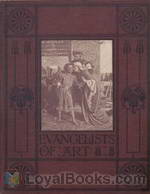 Evangelists of Art Picture-Sermons for Children
Evangelists of Art Picture-Sermons for Children
| |
By: James Stalker (1848-1927) | |
|---|---|
 The Life of St. Paul
The Life of St. Paul
| |
 The Trial and Death of Jesus Christ A Devotional History of our Lord's Passion
The Trial and Death of Jesus Christ A Devotional History of our Lord's Passion
| |
 The Preacher and His Models The Yale Lectures on Preaching 1891
The Preacher and His Models The Yale Lectures on Preaching 1891
| |
By: James [Editor] O'Leary | |
|---|---|
 The Most Ancient Lives of Saint Patrick Including the Life by Jocelin, Hitherto Unpublished in America, and His Extant Writings
The Most Ancient Lives of Saint Patrick Including the Life by Jocelin, Hitherto Unpublished in America, and His Extant Writings
| |
By: Jane M. (Jane Marie) Bancroft (1847-1932) | |
|---|---|
 Deaconesses in Europe and their Lessons for America
Deaconesses in Europe and their Lessons for America
| |
By: Jean Finot (1858-1922) | |
|---|---|
 Modern Saints and Seers
Modern Saints and Seers
| |
By: Jean Toomer (1894-1967) | |
|---|---|
 An Interpretation of Friends Worship
An Interpretation of Friends Worship
| |
By: Jean-Henri Merle d'Aubigné (1794-1872) | |
|---|---|
 History of the Reformation in the Sixteenth Century, Volume 1
History of the Reformation in the Sixteenth Century, Volume 1
The History of the Reformation in the Sixteenth Century, by Jean-Henri Merle d’Aubigné, is a classic work on the great events that re-opened the Christian gospel to a needy world. It tells of how the twenty-year-old Martin Luther, browsing through books in the library at the University of Erfurt, takes down from the shelf a particular volume that has caught his interest. He has never seen anything like it. It is a Bible! He is astonished to find in this volume so much more than the fragments of gospels and epistles that were selected for public reading in churches... | |
 History of the Reformation in the Sixteenth Century, Volume 2
History of the Reformation in the Sixteenth Century, Volume 2
The History of the Reformation in the Sixteenth Century, by Jean-Henri Merle d’Aubigné, is a classic work on the great events that re-opened the Christian gospel to a needy world. The author was a Swiss Protestant pastor. He was also a historian with a great understanding of the Bible, along with a broad and deep knowledge of the Reformation.D’Aubigné tells the story of outstanding people who had a love for God and his word, and who dared to present biblical truths which had been obscured for centuries... | |
By: Jeanne Marie Bouvier de la Motte Guyon | |
|---|---|
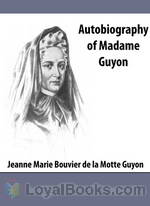 Autobiography of Madame Guyon
Autobiography of Madame Guyon
Jeanne-Marie Bouvier de la Motte-Guyon (commonly known as Madame Guyon) (April 13, 1648 – June 9, 1717) was a French mystic and one of the key advocates of Quietism. Quietism was considered heretical by the Roman Catholic Church, and she was imprisoned from 1695 to 1703 after publishing a book on the topic, A Short and Easy Method of Prayer. This translation is by Thomas Taylor Allen was first published in 1897. Allen’s dates are unknown. | |
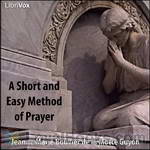 A Short and Easy Method of Prayer
A Short and Easy Method of Prayer
Originally published in 1685, Madame Guyon’s A Short and Easy Method of Prayer is considered a classic of Christian mysticism, influencing great writers and speakers such as John Wesley and Charles Spurgeon. In it, Madame Guyon carefully and briefly sets out her ‘unmethodical method’ by which any and all can commune with God at any time and under any circumstances. | |
 Spiritual Torrents
Spiritual Torrents
| |
 Letters of Madam Guyon
Letters of Madam Guyon
| |
By: Jeremiah Chaplin (1813-1886) | |
|---|---|
 The Riches of Bunyan Selected from His Works
The Riches of Bunyan Selected from His Works
| |
By: Jesse Benedict Carter (1872-1917) | |
|---|---|
 The Religion of Numa And Other Essays on the Religion of Ancient Rome
The Religion of Numa And Other Essays on the Religion of Ancient Rome
| |
By: Jesse Lyman Hurlbut (1843-1930) | |
|---|---|
 Hurlbut's Life of Christ For Young and Old
Hurlbut's Life of Christ For Young and Old
Hurlbut's Life of Christ For Young and Old is a detailed, chronological presentation of the life of Christ, relying heavily on quoted portions of Scripture/ Rev. Hurlbut makes the gospel story accessible for the reader as each episode and teaching is presented as natural dialog. The Life of Christ is a worthy companion to his larger multi-volume Story of the Bible. These are true classics of Christian literature. - Summary by Larry Wilson | |
By: Joanna H. (Joanna Hooe) Mathews (1849-1901) | |
|---|---|
 Uncle Rutherford's Nieces A Story for Girls
Uncle Rutherford's Nieces A Story for Girls
| |
By: Johann Georg Bühler (1837-1898) | |
|---|---|
 On the Indian Sect of the Jainas
On the Indian Sect of the Jainas
| |
By: Johann Michael Reu (1869-1943) | |
|---|---|
 The Confutatio Pontificia
The Confutatio Pontificia
| |
By: Johannes Henricus Scholten (1811-1885) | |
|---|---|
 A Comparative View of Religions
A Comparative View of Religions
| |
By: John Beames | |
|---|---|
 Chaitanya and the Vaishnava Poets
Chaitanya and the Vaishnava Poets
| |
By: John Bovee Dods (1795-1872) | |
|---|---|
 Twenty-Four Short Sermons On The Doctrine Of Universal Salvation
Twenty-Four Short Sermons On The Doctrine Of Universal Salvation
| |
By: John Boys (1571-1625) | |
|---|---|
 An Exposition of the Last Psalme
An Exposition of the Last Psalme
| |
By: John Brownlie | |
|---|---|
 Hymns of the Greek Church Translated with Introduction and Notes
Hymns of the Greek Church Translated with Introduction and Notes
| |
 Hymns from the East Being Centos and Suggestions from the Office Books of the Holy Eastern Church
Hymns from the East Being Centos and Suggestions from the Office Books of the Holy Eastern Church
| |
By: John Bunyan (1628-1688) | |
|---|---|
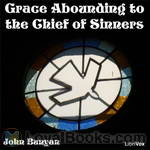 Grace Abounding to the Chief of Sinners
Grace Abounding to the Chief of Sinners
Grace Abounding is the spiritual autobiography of John Bunyan, who also penned Pilgrim’s Progress, perhaps one of the most significant pieces of Christian literature, second only to the Bible. Grace Abounding follows Bunyan’s struggle to find true repentance and forgiveness, his battle with Satan’s temptations of unbelief, his comfort found in the Bible and his overarching victory gotten by the grace of God through Jesus Christ his Son. Readers familiar with Pilgrim’s Progress will recognize... | |
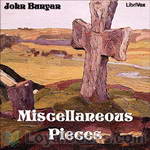 Miscellaneous Pieces
Miscellaneous Pieces
John Bunyan (November 28, 1628 – August 31, 1688), a Christian writer and preacher, was born at Harrowden (one mile south-east of Bedford), in the Parish of Elstow, England. He wrote The Pilgrim’s Progress, arguably the most famous published Christian allegory. In the Church of England he is remembered with a Lesser Festival on 30 August. Bunyan became a popular preacher as well as a prolific author, though most of his works consist of expanded sermons. In theology he was a Puritan, but there was nothing gloomy about him. The portrait his friend Robert White drew, which has often been reproduced, shows the attractiveness of his true character. | |
 The Pilgrim's Progress from this world to that which is to come
The Pilgrim's Progress from this world to that which is to come
| |
 Works of John Bunyan
Works of John Bunyan
| |
 The Holy war, made by King Shaddai upon Diabolus
The Holy war, made by King Shaddai upon Diabolus
| |
 An Exhortation to Peace and Unity
An Exhortation to Peace and Unity
| |
 The Pharisee and Publican
The Pharisee and Publican
| |
 The Jerusalem Sinner Saved; or, Good News for the Vilest of Men
The Jerusalem Sinner Saved; or, Good News for the Vilest of Men
| |
By: John C. Symons | |
|---|---|
 The Village Sunday School With brief sketches of three of its scholars
The Village Sunday School With brief sketches of three of its scholars
| |
By: John Calvin (1509-1564) | |
|---|---|
 Institutes Of The Christian Religion Book 1 (Allen Translation)
Institutes Of The Christian Religion Book 1 (Allen Translation)
Now, my design in this work has been to prepare and qualify students of theology for the reading of the divine word, that they may have an easy introduction to it, and be enabled to proceed in it without any obstruction. For I think I have given such a comprehensive summary, and orderly arrangement of all the branches of religion, that, with proper attention, no person will find any difficulty in determining what ought to be the principal objects of his research in the Scripture, and to what end he ought to refer any thing it contains... | |
By: John Cunningham (1819-1893) | |
|---|---|
 The Ordinance of Covenanting
The Ordinance of Covenanting
| |
By: John Donne (1572-1631) | |
|---|---|
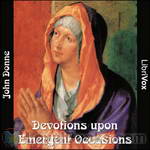 Devotions upon Emergent Occasions
Devotions upon Emergent Occasions
Devotions upon Emergent Occasions is a 1624 prose work by the English writer John Donne. It is a series of reflections that were written as Donne recovered from a serious illness, believed to be either typhus or relapsing fever. (Donne does not clearly identify the disease in his text.) The work consists of twenty-three parts describing each stage of the sickness. Each part is further divided into a Meditation, an Expostulation, and a Prayer. The seventeenth meditation is perhaps the best-known part of the work... | |